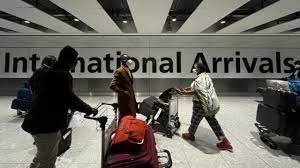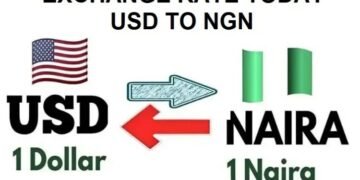The depreciation of the naira against the United States dollar by 55 per cent at the official foreign exchange market has resulted in a corresponding decline in airfares on international routes in Nigeria, as per goldennewsng findings.
The naira plummeted from approximately 900/dollar to over 1,400/dollar on Monday after the FMDQ Exchange, responsible for recording the nation’s official exchange rate, revised its methodology in response to the Central Bank of Nigeria’s accusation of approved foreign exchange dealers reporting false figures.
Barely 24 hours after the official exchange rate adjustment, international airlines operating in Nigeria adjusted their ticket pricing exchange rate from about N900/dollar to N1,421/dollar.
This development translated to an approximate 55 per cent increase in international airfares on Nigerian routes. Findings on Wednesday revealed a commensurate rise in ticket prices for various routes, including Lagos-London-Lagos, Lagos-New York-Lagos, and Lagos-Johannesburg.
The President of the National Association of Nigerian Travel Agencies, Susan Akporiaye, confirmed the sharp increase, expressing concern about the impact on travel agencies facing financial strain.
Akporiaye noted that travelers, compelled by serious business such as medical or educational reasons, were reluctantly parting with more money. For example, an air ticket that previously cost $1000 surged to N1.5m.
While empathizing with travelers, she anticipated a decrease in prices, attributing the situation to the country’s economic challenges rather than the airlines’ fault.
Akporiaye advised airlines to offer lower inventory options to accommodate financially burdened travelers and suggested opening options like N1m airfares. She stressed that airlines are not responsible for setting the exchange rate.
Price checks by Goldennewsng showed average airfare ticket costs to high-traffic international destinations, such as London at N2.77m, Dubai at N2.65m, New York at N3.2667m, and Johannesburg at N3.05m.
Despite the fluctuating exchange rates, the International Air Transport Association reported a 38.7 per cent increase in African airlines’ annual traffic in 2023 compared to the previous year. However, the correspondent could not verify if there is data supporting a drop in travel demands in Nigeria.
Since the naira’s significant fall on June 14, 2023, due to the decision to allow the currency to fluctuate freely, airlines and passengers have struggled with soaring air ticket prices, affecting not only the aviation sector but also prices of goods and services in general.




















